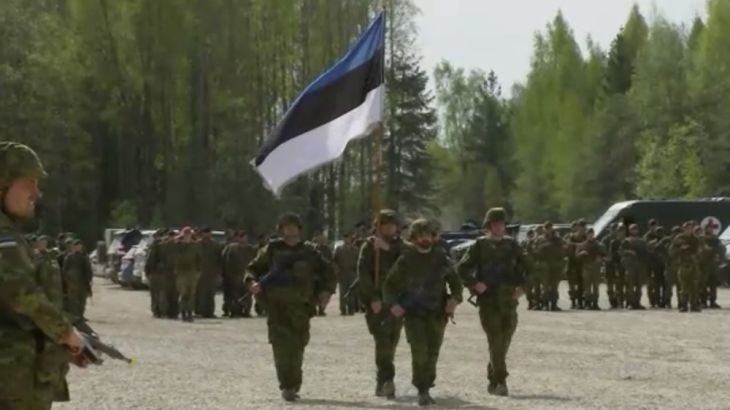
Estonia: Going on a Bear Hunt
How would Estonia and its NATO allies respond should the small Baltic state be invaded by Russia?
Russia says that no more than 12,700 of its troops will be participating in what are purely defensive exercises; NATO officials say the real number of Russian military personnel involved could reach 100,000 and are part of a muscular display of firepower aimed at unsettling some of the more vulnerable members of the Western alliance.
It’s a grumbling dispute over war games being staged along Russia’s northwestern borders this September, that hasn’t yet become a full-blown quarrel, but can perhaps be seen as a sign of the times.
Keep reading
list of 4 itemsNATO allies must do more as Ukraine runs out of ammunition: Stoltenberg
Nordic tensions on the rise amid Russian anger over NATO accessions
Flag of NATO’s 32nd member, Sweden, raised at alliance’s headquarters
Armies the world over routinely send their troops on exercise; checking out the fighting skills, battle-readiness and tactical nous of their forces, playing with new equipment and putting such things as command structures, supply lines, medical backup and interservice cooperation to the test. What, after all, is the point of having armed forces if they don’t train and practise and you don’t know whether or not they can do what they are designed for?
In that sense, at least, this month’s Zapad exercises, as the Russians are calling them, are no more remarkable than any of the other manoeuvres its troops annually undertake – or indeed those of NATO or China or Japan or India or any other country or alliance with formally constituted armed forces.
But of course, context is everything and the Russian 2017 war games are taking place after three years of mounting tension along its borders with Europe, in the still-turbulent backwash of its 2014 annexation of Ukraine’s Crimean Peninsula and when relations with the West, over everything from Russia’s military support for Syria’s Bashar al-Assad to perceived interference in the US presidential elections, have become increasingly tetchy.
If you add into that mix the fact that the new occupant of the White House in Washington, DC, has an oddly ambiguous attitude to his counterpart in the Kremlin (not unconnected, say some, to the aforesaid electoral meddling) and at the same time a less than wholehearted relationship with his country’s own North Atlantic treaty partners and it’s understandable why the thought of Russian soldiers, tanks and fighter jets deploying through the forests close to their borders would set some European pulses racing.
The specific dispute over troop numbers taking part in Zapad 1017 is significant because if only 12,700 are involved then it’s just a fraction below the level that would require Russia to allow NATO observers under international agreements. The chief of the Russian general staff, General Valery Gerasimov, insisted recently that the war games were not aimed against any third country, but were merely designed to simulate how to defend the northwest portion of Belarus – a strategically important regional ally – from a domestic separatist insurrection fuelled by support from abroad. NATO believes that the numbers will be far greater and will necessarily involve mobilizing a significant portion of Moscow’s military machine, with separate but coordinated rehearsals in the area involving armoured units, strategic missile forces, paratroops, air power, security detachments and units of Russia’s Baltic Sea fleet.
Thus nerves are being stretched, particularly in the Baltic nations of Estonia, Latvia and Lithuania, three bordering, former Soviet states that are now members of NATO and which, since the Russian sponsored separatist conflict in Eastern Ukraine and the annexation of Crimea have become increasingly anxious that their turn may be next. It’s why, over the past three years, the alliance has been steadily strengthening its forces in the Baltic and indeed routinely holds its own annual “what-if” exercises in the region, which, of course, the Russians regard as equally provocative and threatening.
So could these conflict rehearsals ever translate into the real thing? And if they do, then how would the Baltic states, inevitably on the front line between the two sides, respond? All are now proudly independent but have large ethnic Russian communities, all are able on their own to offer only token military resistance to Russian aggression but are nonetheless now participants in a powerful military alliance. Earlier this year as NATO was holding its own war games in Estonia, reporter Eric Campbell went to find out.